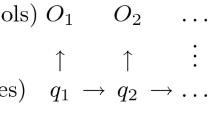Abstract
In this paper we present and evaluate two approaches for the generation of Semantic Fields, which are used as a tool for resource discovery in the Semantic Web. We mainly concern ourselves with semantic networks that describe their interests and resources by means of ontologies. Semantic Fields are intended to help users to locate these resources by specifying a brief description (also as an ontology). We propose two ways to automatically build Semantic Fields. The first one is used in the KREIOS approach, which is based on the pre-computation of distances between all the ontology pairs. The second one is based on a fast incremental clustering algorithm, which groups together similar ontologies as they are published. These groups constitute a pre-computed set of Semantic Fields.
Preview
Unable to display preview. Download preview PDF.
Similar content being viewed by others
References
Bertino, E., Guerrini, G., Mesiti, M.: A Matching Algorithm for Measuring the Structural Similarity between an XML Document and a DTD and its Applications. Information Systems 29(1), 23–46 (2004)
Budanitsky, A., Hirst, G.: Semantic Distance in WordNet: An Experimental, Application-oriented Evaluation of Five Measures. In: Workshop on WordNet and Other Lexical Resources, NAACL 2000, Pittsburgh (2000)
Dalamagas, T., Cheng, T., Winkel, K.-J., Sellis, T.: A methodology for clustering XML documents by structure. Information Systems (in Press)
Doan, A., et al.: Learning to Match Ontologies on the Semantic Web. VLDB Journal 12(4), 303–319 (2003)
Crespo, A., Garcia-Molina, H.: Semantic Overlay Networks for P2P Systems. Technical report, Computer Science Department, Stanford University (2002)
Giunchiglia, F., Shvaiko, P., Yatskevich, M.: S-Match: an Algorithm and an Implementation of Semantic Matching. In: Bussler, C.J., Davies, J., Fensel, D., Studer, R. (eds.) ESWS 2004. LNCS, vol. 3053, pp. 61–75. Springer, Heidelberg (2004)
Hong-Hai, D., Erhard, R.: COMA - A System for Flexible Combination of Schema Matching Approaches. In: Proc. 28th Intl. Conference on Very Large Databases (VLDB), Hongkong (2002)
Hess, A., Johnston, E., Kushmerick, N.: ASSAM: A Tool for Semi-automatically Annotating Semantic Web Services. In: McIlraith, S.A., Plexousakis, D., van Harmelen, F. (eds.) ISWC 2004. LNCS, vol. 3298, pp. 320–334. Springer, Heidelberg (2004)
Navas, I., Roldán, M.M., Aldana, J.F.: Kreios: Towards Semantic Interoperable Systems. In: Yakhno, T. (ed.) ADVIS 2004. LNCS, vol. 3261, pp. 161–171. Springer, Heidelberg (2004)
Lee, M., Yang, L., Hsu, W., Yang, X.: XClust: clustering XML schemas for effective integration. In: Proc. CIKM 2002, pp. 292–299 (2002)
Sanz, I., Pérez, J.M., Berlanga, R., Aramburu, M.J.: XML Schemata Inference and Evolution. In: Mařík, V., Štěpánková, O., Retschitzegger, W. (eds.) DEXA 2003. LNCS, vol. 2736, pp. 109–118. Springer, Heidelberg (2003)
Euzenat, J., Valtchev, P.: Similarity-Based Ontology Alignment in OWL-Lite. In: ECAI 2004, Valencia, pp. 333–337 (2004)
Maedche, A., Staab, S.: Measuring Similarity between Ontologies. In: Gómez-Pérez, A., Benjamins, V.R. (eds.) EKAW 2002. LNCS (LNAI), vol. 2473, pp. 251–263. Springer, Heidelberg (2002)
Rodriquez, M.A., Egenhofer, M.J.: Determining Semantic Similarity Among Entity Classes from Different Ontologies. IEEE Transactions on Knowledge Data Engineering 15(2), 442–456 (2003)
Salton, G.: Automatic Text Processing. Addison-Wesley, Reading (1989)
Yang, B., Garcia-Molina, H.: Comparing Hybrid Peer-to-peer systems. In: Proc. of the 27th International Conference on Very Large Data Bases, Rome, Italy (2001)
Author information
Authors and Affiliations
Editor information
Editors and Affiliations
Rights and permissions
Copyright information
© 2005 Springer-Verlag Berlin Heidelberg
About this paper
Cite this paper
Navas, I., Sanz, I., Aldana, J.F., Berlanga, R. (2005). Automatic Generation of Semantic Fields for Resource Discovery in the Semantic Web. In: Andersen, K.V., Debenham, J., Wagner, R. (eds) Database and Expert Systems Applications. DEXA 2005. Lecture Notes in Computer Science, vol 3588. Springer, Berlin, Heidelberg. https://doi.org/10.1007/11546924_69
Download citation
DOI: https://doi.org/10.1007/11546924_69
Publisher Name: Springer, Berlin, Heidelberg
Print ISBN: 978-3-540-28566-3
Online ISBN: 978-3-540-31729-6
eBook Packages: Computer ScienceComputer Science (R0)




